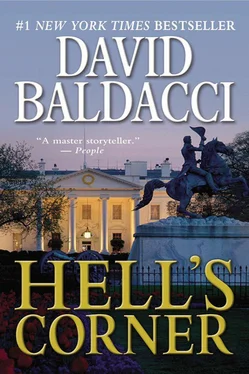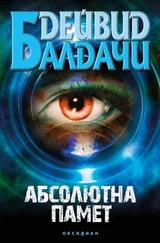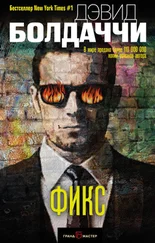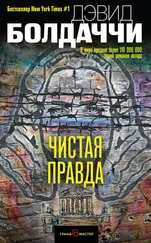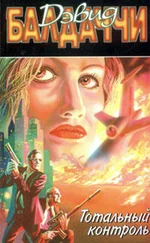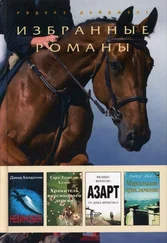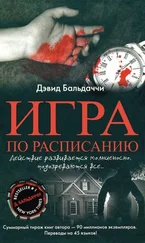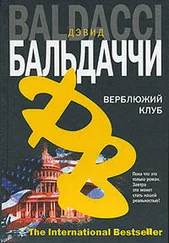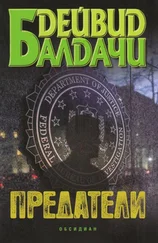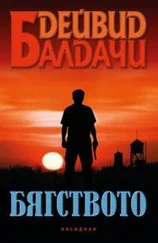David Baldacci
Hell’s Corner
To Michelle
Twenty years of marriage and twenty books.
A ride of a lifetime with the woman I love.

Oliver Stone was counting seconds, an exercise that had always calmed him. And he needed to be calm. He was meeting with someone tonight. Someone very important. And Stone didn’t quite know how it was going to go. He did know one thing for certain. He was not going to run. He was through running.
Stone had just returned from Divine, Virginia, where Abby Riker, a woman he’d met, lived. Abby had been the first woman Stone had feelings for since he’d lost his wife three decades prior. Despite their obvious fondness for one another, Abby would not leave Divine, and Stone could not live there. For better or worse, much of him belonged to this town, even with all the pain it had caused.
That pain might become even more intense. The communication he’d received an hour after returning home had been explicit. They would come for him at midnight. No debate was allowed, no negotiation suffered through, no chance of any compromise. The party on the other end of the equation always dictated the terms.
A few moments later he stopped counting. Car tires had bitten into the gravel that lined the entrance to Mt. Zion Cemetery. It was a historical if humble burial site for African Americans who’d gained prominence by fighting for things their white counterparts had always taken for granted, like where to eat, sleep, ride in a bus or use the bathroom. The irony had never been lost on Stone that Mt. Zion rested high above fancy Georgetown. It was not all that long ago that the wealthy folks here only tolerated their darker brethren if they wore a maid’s starched uniform or else were handing out drinks and finger foods and keeping their obedient gaze on the polished floors.
Car doors opened and car doors closed. Stone counted three clunks of metal against metal. So a trio. Of men. They wouldn’t send a woman for this, he didn’t think, though that might simply have been the prejudice of his generation.
Glocks or Sigs or perhaps customized models, depending on whom they’d sent to do the deed. Regardless, the weapons would be chambering efficiently lethal ordnance. The guns would be holstered under nice suit jackets. No black-clad storm troopers rappelling from the skids of go-fast choppers in quaint, well-connected Georgetown. The extraction would be quiet, no important person’s sleep interrupted.
They knocked.
Polite.
He answered.
To show respect.
These people had no personal grudge against him. They might not even know who he was. It was a job. He’d done it, though he’d never knocked beforehand. Surprise and then the millisecond-long pull of a trigger had been his MO.
A job.
At least I thought that, because I didn’t have the courage to face the truth.
As a soldier, Stone had never had any qualms about ending the life of anyone who was trying to terminate his. War was Darwinism at its most efficient and the rules were innately commonsensical, kill or be killed chief among them. However, what he had done after leaving the military had been different in a way that left him permanently mistrustful of those in power.
He stood in the doorway, framed by the light behind him. He would have chosen this moment to fire, if he’d been on the trigger side. Quick, clean, no chance of missing. He’d given them their opportunity.
They didn’t take it. They were not going to kill him.
It was actually four men, and Stone felt slight apprehension that his observations had been flawed.
The leader of the pack was trim, five-ten, short hair and efficient eyes that took in everything and gave nothing in return. He motioned to the vehicle parked by the gate, a black Escalade. There was a time when Stone would have rated a platoon of crackerjack killers coming for him by land, sea and air. Those days, apparently, were over. A quartet of suits in a Cadillac on steroids was enough.
There were no unnecessary words uttered. He was expertly searched and ushered into the vehicle. He sat in the middle bench seat, a man on either side of him. He could feel each of their muscled arms as it lay against his. They were tensed, ready to block any attempt by Stone to get to their weapons. Stone had no thought of making such an attempt. Now, outnumbered four to one, he would lose that battle ten times out of ten, a blackened tattoo painted on his forehead, a third eye his reward for the fatal miscalculation. Decades ago it was probable that four men far better than these would lie dead as he walked away to fight another day. But those days were long in the past.
“Where?” he asked. He never expected a response and didn’t get one.
Minutes later he stood alone outside a building virtually every American would recognize. He didn’t stand there for long. More men appeared, better and higher-ranked than the ones who had just dropped him off. He was now in the inner ring. The personnel became more skilled the closer one approached the center. They escorted him down a corridor with numerous doorways. Every single one of them was closed, and it wasn’t simply the lateness of the hour. This place never really slept.
The door opened and the door closed. Stone was alone once more, but again not for long. A door opened in another part of the room and the man entered. He didn’t look at Stone, but motioned for him to sit.
Stone sat.
The man settled down behind his desk.
Stone was an unofficial visitor here. Normally a log was kept of everyone passing through this place, but not tonight. Not him. The man was dressed casually, chinos, open-collared shirt, loafers. He slid glasses over his face, rustled some papers on his desk. A single light burned next to him. Stone studied him. The man looked intense and determined. He had to be to survive this place. To manage his way through the world’s most impossible job.
He put down the papers; slid up the glasses onto the lined forehead.
“We have a problem,” said James Brennan, the president of the United States. “And we need your help.”
Stone was mildly surprised but didn’t show it. Registering surprise was never good in situations like this. “A problem with what?”
“The Russians.”
“All right.” Nothing new there, thought Stone. We often have problems with the Russians.
The president continued, “You’ve been there.” It wasn’t a question.
“Many times.”
“You speak the language.” Again, not a question, so Stone remained silent. “You know their tactics.”
“I used to know them. That was a long time ago.”
Brennan smiled grimly. “Just like hairdos and clothes, if one hangs around long enough, things come back in style, including, apparently, espionage techniques.”
The president leaned back and put his feet up on the Resolute desk that had been a gift from Queen Victoria to America near the end of the nineteenth century. Ruther-ford B. Hayes had been the first sitting president to use it, and Brennan the latest.
“The Russians have a web of spy rings entrenched in this country. The FBI has arrested some of them, infiltrated others, but more are out there of which we have no information.”
“Countries spy on each other all the time,” said Stone. “I would be stunned if we didn’t have intelligence operations going on over there.”
“That’s beside the point.”
Читать дальше
